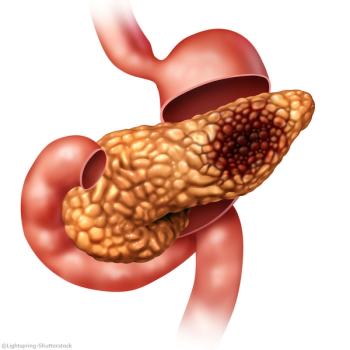
Oncology NEWS International
- Oncology NEWS International Vol 17 No 10
- Volume 17
- Issue 10
Nanoparticles extend survival in pancreatic ca patients
STOCKHOLM-A novel anti-neovascular therapy substantially extended survival time over standard gemcitabine (Gemzar) therapy in pancreatic cancer patients, according to the results of a phase II study presented at ESMO 2008 (abstract LBA7).
STOCKHOLM-A novel anti-neovascular therapy substantially extended survival time over standard gemcitabine (Gemzar) therapy in pancreatic cancer patients, according to the results of a phase II study presented at ESMO 2008 (abstract LBA7).
Professor J. Matthias Lhr of Karolinska University, Stockholm, reported 12-month survival data from a multicenter, open-label phase II trial that compared the novel remedy to standard therapy in the first-line treatment of advanced pancreatic adenocarcinoma.
The agent is cationic lipid complexed paclitaxel nanoparticles (EndoTAG-1, MediGene AG). EndoTAG-1 targets activated, negatively charged endothelial cells of the tumor blood vessels with its cationic-carrier liposomes.
“EndoTAG consists of charged particles that bind preferentially to the fast-growing endothelial cells in new blood vessels being formed by tumors,” Dr. Lhr explained.
“Paclitaxel (Taxol), which in itself is not very efficient in pancreatic cancer, is then released and directly reaches the vessels,” he said.
The study, spearheaded in Germany, included 200 patients with locally advanced disease who were randomized to standard treatment with weekly gemcitabine 1000 mg/m2, or to gemcitabine plus one of three dose levels of EndoTAG-1 administered twice weekly. Patients were treated for 7 weeks.
The protocol was amended after 98 patients were enrolled to allow repeated treatment cycles of the combination when patients achieved a response or stable disease. Patients received a mean of 2.5 additional cycles of the experimental regimen.
Case for extended treatment
The combination treatment extended survival, especially in patients who received repeated courses. Mean overall survival for subjects receiving gemcitabine alone was 7.2 months.
The mean overall survival was 13.6 months for patients treated with repeated cycles of the experimental regimen, Dr. Lhr reported.
“These results are the best I have seen in the palliative treatment of pancreatic cancer,” he said.
The results were most pronounced for patients who received extended treatment under the amended protocol. In this analysis, median overall survival was 6.8 months for gemcitabine monotherapy, 9.1 months for gemcitabine plus EndoTAG-1 11 mg/m2; 13.6 months for gemcitabine plus EndoTAG-1 22 mg/m2; and 10.8 months for gemcitabine plus EndoTAG-1 44 mg/m2.
Under the original protocol (7 weeks of treatment), median survival was 7.2 months, 8.4 months, 8.7 months, and 9.4 months, respectively.
Commentary
Donald M. McDonald, MD, PhD, from the Cardiovascular Research Institute and the Comprehensive Cancer Center at University of California, San Francisco commented that, “any treatment advance in this disease is worthy of our attention. This is justified to go to the next step.”
In fact, a global phase III trial of over 800 patients should begin accruing early in 2009; patients will receive the novel regimen until progression, he said.
Dr. McDonald has conducted seminal research in liposomes. He explained that “liposomes like this have a positive charge that is chemically built into how it is made.
They home in [on] the blood vessels in tumors. They were originally believed to be too toxic for use. Now we see that this is not the case.”
Articles in this issue
over 17 years ago
Nobody puts cancer in a corner!over 17 years ago
ACS spends big money to highlight healthcare system deficienciesover 17 years ago
Visits to oncologists up, but profit per patient is on the declineover 17 years ago
Report finds high rate of adoption of IMRTover 17 years ago
Some HER2+ tumors prove resistant to trastuzumabover 17 years ago
NIH bankrolls molecular probes for targeted therapyover 17 years ago
Oropharyngeal ca: IMRT spares salivary glandsover 17 years ago
Fear of audit, lazy billing erodes profitsover 17 years ago
Apoptosis inducer hits melanoma with double whammyover 17 years ago
Triathlon for an MPD cureNewsletter
Stay up to date on recent advances in the multidisciplinary approach to cancer.






































